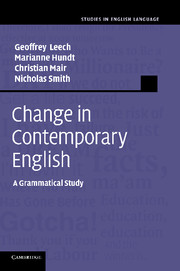Book contents
- Frontmatter
- Contents
- List of figures
- List of tables
- Preface
- Abbreviations and symbolic conventions
- 1 Introduction: ‘grammar blindness’ in the recent history of English?
- 2 Comparative corpus linguistics: the methodological basis of this book
- 3 The subjunctive mood
- 4 The modal auxiliaries
- 5 The so-called semi-modals
- 6 The progressive
- 7 The passive voice
- 8 Take or have a look at a corpus? Expanded predicates in British and American English
- 9 Non-finite clauses
- 10 The noun phrase
- 11 Linguistic and other determinants of change
- Appendix I The composition of the Brown Corpus
- Appendix II The C8 tagset used for part-of-speech tagging of the four corpora
- Appendix III Additional statistical tables and charts
- References
- Index
1 - Introduction: ‘grammar blindness’ in the recent history of English?
Published online by Cambridge University Press: 18 January 2010
- Frontmatter
- Contents
- List of figures
- List of tables
- Preface
- Abbreviations and symbolic conventions
- 1 Introduction: ‘grammar blindness’ in the recent history of English?
- 2 Comparative corpus linguistics: the methodological basis of this book
- 3 The subjunctive mood
- 4 The modal auxiliaries
- 5 The so-called semi-modals
- 6 The progressive
- 7 The passive voice
- 8 Take or have a look at a corpus? Expanded predicates in British and American English
- 9 Non-finite clauses
- 10 The noun phrase
- 11 Linguistic and other determinants of change
- Appendix I The composition of the Brown Corpus
- Appendix II The C8 tagset used for part-of-speech tagging of the four corpora
- Appendix III Additional statistical tables and charts
- References
- Index
Summary
Surprising though this may be in view of a vast and growing body of literature on recent and ongoing changes in the language, there is very little we know about grammatical change in written standard English in the twentieth century. No one would seriously doubt that grammar constitutes a central level of linguistic structuring, and most people would agree that standard English, while being one variety among many from a purely descriptive-linguistic point of view, has nevertheless been the most studied and best documented one because of its social and cultural prominence. What, then, are the causes of this apparent ‘grammar blindness’?
Grammar is more than an arbitrary list of shibboleths
Among lay commentators on linguistic change what we have is not really complete blindness but an extreme restriction of the field of vision. Rather than see grammar as the vast and complex system of rules which helps us organize words into constituents, clauses and sentences, the term is restricted to refer to a collection of variable and disputed usages which have been selected arbitrarily in the course of almost 300 years of prescriptive thinking about good grammar and proper English.
Let us illustrate this restriction of the field of vision with a first example. English has a complex and highly differentiated inventory of noun-phrase post-modification by means of relative clauses.
Information
- Type
- Chapter
- Information
- Change in Contemporary EnglishA Grammatical Study, pp. 1 - 23Publisher: Cambridge University PressPrint publication year: 2009
